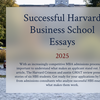For Dr. Daniel Federman '49, it's all about interpersonal relations.
A charismatic smile and firm handshake greet all who enter the office of the dean for medical education at Harvard Medical School (HMS).
Federman, a Harvard success story from the start, will focus in his HMS Class Day speech on just that quality--the personal touch sometimes forgotten by hard-working, high-achieving physicians.
In his speech today, entitled "A Doctor in the House," Federman will discuss the all-important doctor-patient relationship.
Federman is an expert on the topic. Besides having dealt with patients himself for many years, he teaches an HMS course called "Patient-Doctor."
Though a rapport with patients is important, Federman is also quick to remind his students that relationships are not the be-all and end-all of medicine.
"We are part of a highly rational and highly scientific field," he says.
A Harvard-Heavy History
He recalls that every day of his college experience was "just remarkable and incredibly interesting."
"That sounds Pollyanna, but its not," he says.
He graduated summa cum laude in 1949 with a bachelor's degree in social relations, a concentration formed the year he arrived.
The social relations concentration, a combination of psychology, sociology and cultural anthropology, nurtured Federman's interest in psychoanalysis--an interest he had all but forgotten about until his recent high school reunion.
Paging through a copy of his old yearbook from DeWitt Clinton High School in the Bronx, Federman was reminded that at the time he'd intended to become a psychiatrist.
In order to pursue that goal, he enrolled at Harvard Medical School, continuing his Harvard education, which he jokingly refers to as "Preparation H."
Federman graduated magna cum laude from the medical school in 1953. He spent the next two years completing his residency at Massachusetts General Hospital.
There, he met his future wife Betty, who was the head nurse at the time.
Besides sharing his interest in medicine, Betty Federman also harbored a knack for teaching.
"I realized that she couldn't teach me everything I needed to know in just two months, so we got married, and we've been at it ever since," her husband says.
By this time, Federman had deviated from the career path he'd envisioned in high school. Intrigued by his first-year physiology course in medical school, he went on to specialize in reproductive physiology and reproductive disorders.
His 1967 book Abnormal Sexual Development is billed as the first clear explanation for disorders of sexual development.
Before coming to Harvard in 1977, Federman spent four years as chair of medicine at Stanford University. But he couldn't tear himself away from Harvard for long.
He returned when the new dean of the medical school, Daniel Tosteson, asked Federman to join his new administrative team.
"His plans for the school were so fascinating that they swept me away. I couldn't resist," Federman says. "He was a brilliant and inspiring dean."
Today, Federman specializes in endocrinology and genetics and sees patients regularly for consultation.
He has also served as regent, president and master of the American College of Physicians, in addition to being a member of the Institute of Medicine of the National Academy of Sciences.
A Teacher at Heart
"In my heart, I am a doctor, teacher, administrator," he says, enumerating his identities in the order of their importance to him.
His principal goals, he says, are "making things clear to students and younger physicians" and "continuing medical education."
By all standards, Federman has been successful in these endeavors.
"Dan Federman is a quintessential physician, teacher, scholar," says Joseph B. Martin, the current dean of the medical school. "He's among the most articulate educators in the entire world of medicine."
Federman draws rave reviews from his students as well.
He is the much-ballyhooed head instructor for a required first-year course in genetics, embryology and reproduction.
And in an annual show put on by second-year students, Federman is traditionally included in the spoof on faculty.
Federman speaks at the orientation for first-year medical students, and he often gives lectures on campus.
He says he makes a point of getting involved in student projects and serving on various ad hoc committees that include students.
As a clinician at University Health Services and Brigham and Women's Hospital, Federman interacts with third- and fourth-year medical students going through their rotations.
In these ways, he ensures that all students hear him speak and learn about his work at some point in their time at HMS.
It comes as no surprise, then, that after student nominations and votes for superior faculty members by the entire class, Federman won "hands down," says Nancy E. Oriol, the associate dean of student affairs.
"All three years that I have been here, he has been nominated," she says.
"He is just an amazing role model to the students," she continues. "He has put his life into medical education and he has championed the moral and ethical development of young physicians."
Federman is also a teacher to his two daughters. Lise, a graduate of the Harvard School of Public Health, is now a health care administrator and consultant. Carolyn, an HMS graduate, is a child and adolescent psychiatrist in Chicago. She also takes care of her son Daniel, who recently turned eight months old.
Federman has decided that this year will be a turning point in his career.
In July, he will step down from his post as dean of medical education. However, he will continue at HMS as senior dean for alumni relations and clinical teaching.
And at least one more group will get to hear Federman's wise words.
His audience today has a treat in store, Oriol says.
"He is by far the best speaker I have ever heard," she says. "When he puts his golden words to those powerful concepts, they take flight."
Read more in News
Finding Your Interests and Identity Can Take TimeRecommended Articles
-
HMS's 'New Pathway' Curriculum Copied at Other SchoolsMedical schools across the country are offering courses that take students out of large lectures and turn them from doodlers
-
HMS Report: Study Subjects Need ProtectionResearchers need to better protect patients in clinical trials and tighten oversight of medical studies, a national advisory panel headed
-
Medical School's 'New Pathway' Curriculum Copied at other SchoolsMedical schools across the country are offering courses that take students out of large lectures and turn them from doodlers
-
Dressing Shakespeare in Drag“To drag or not to drag?” This fall, the Hyperion Shakespeare Company answered that long-provoking question affirmatively. The theatrical student ...
-
 Pericles
Pericles -
 The Spanish Tragedy
The Spanish Tragedy













